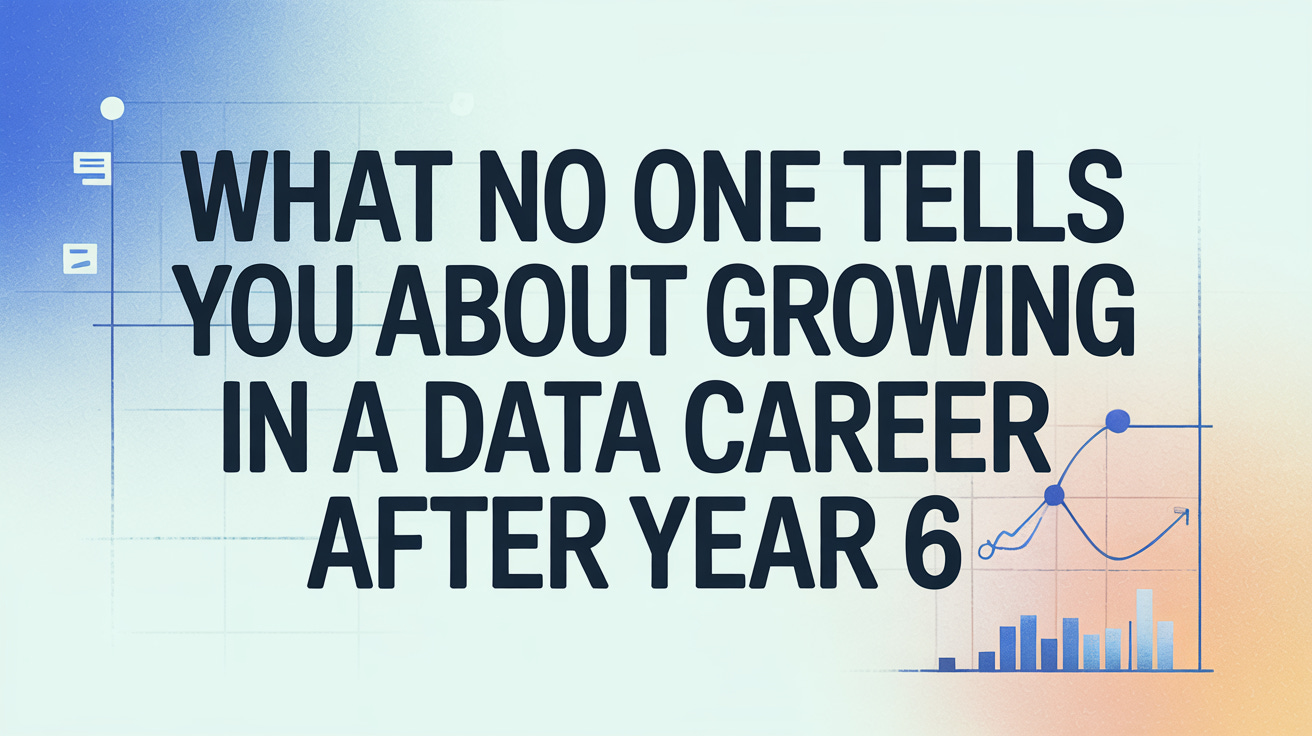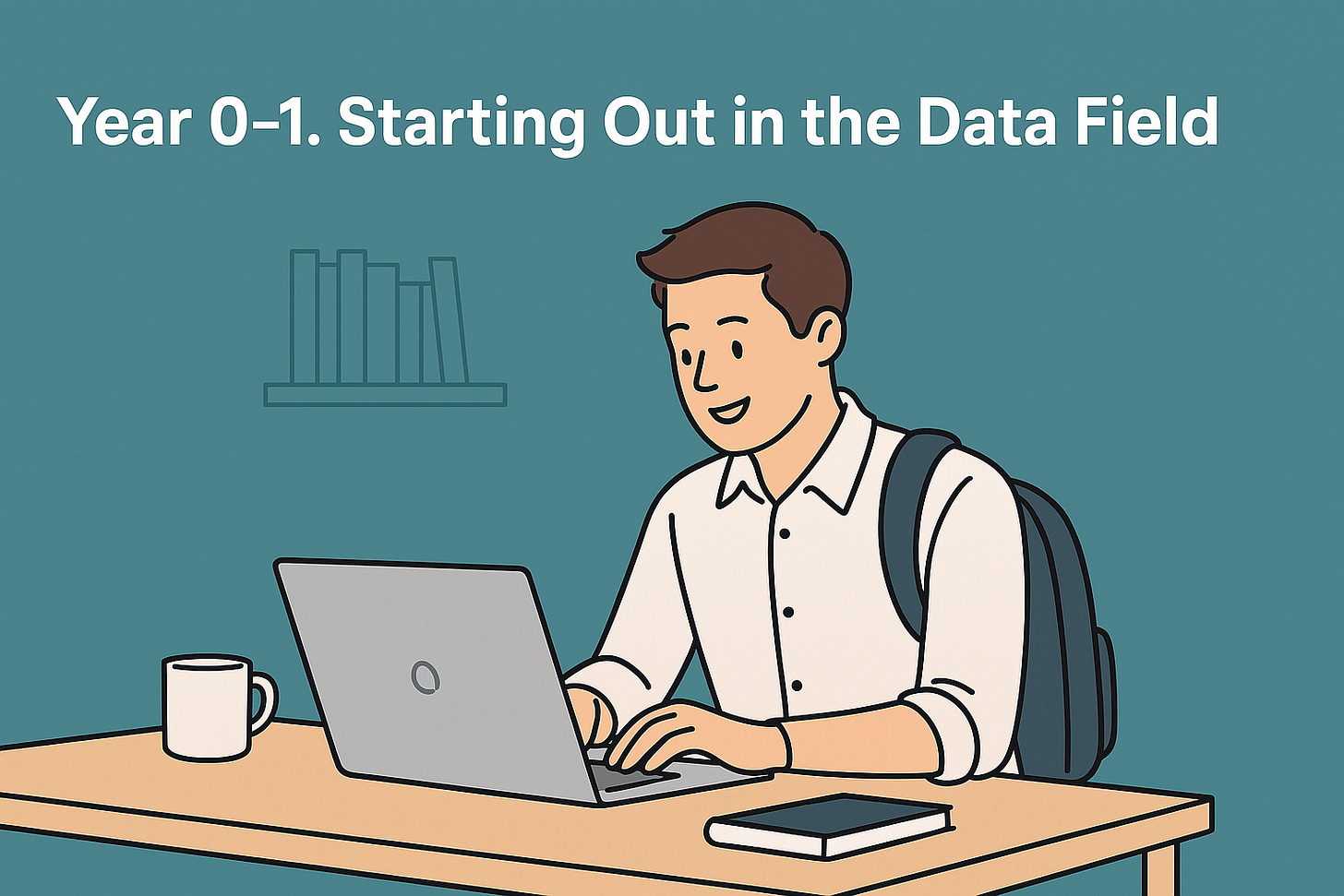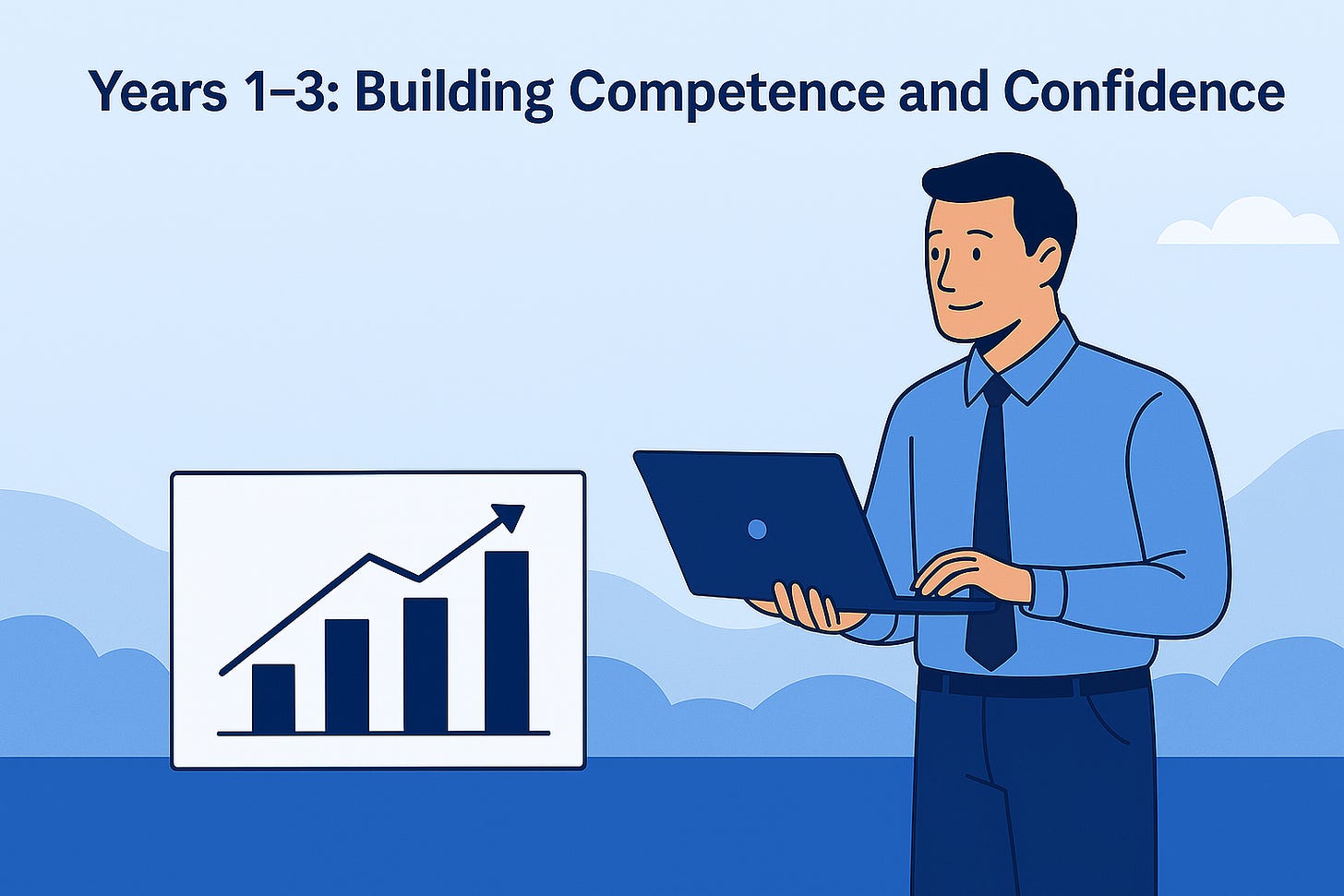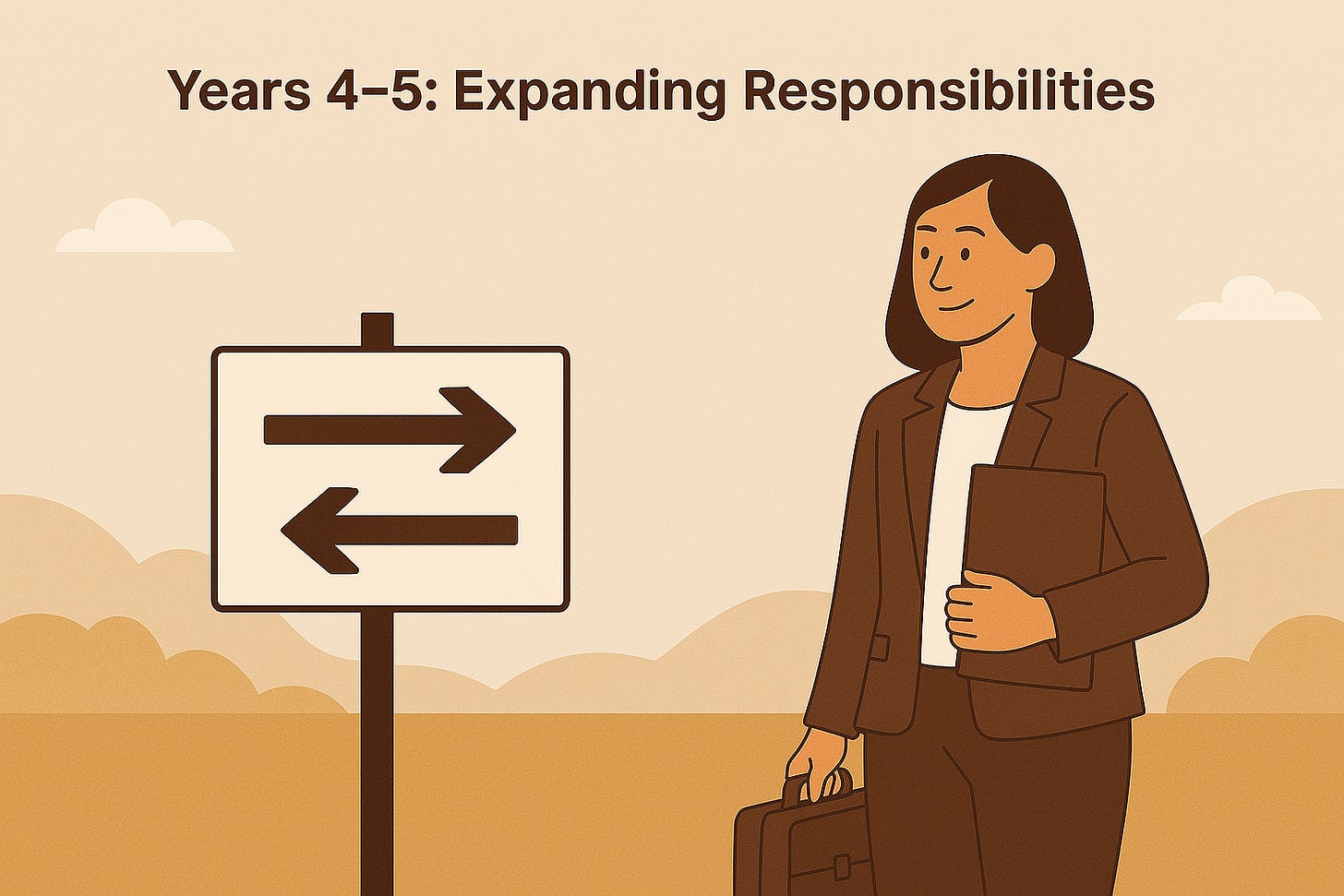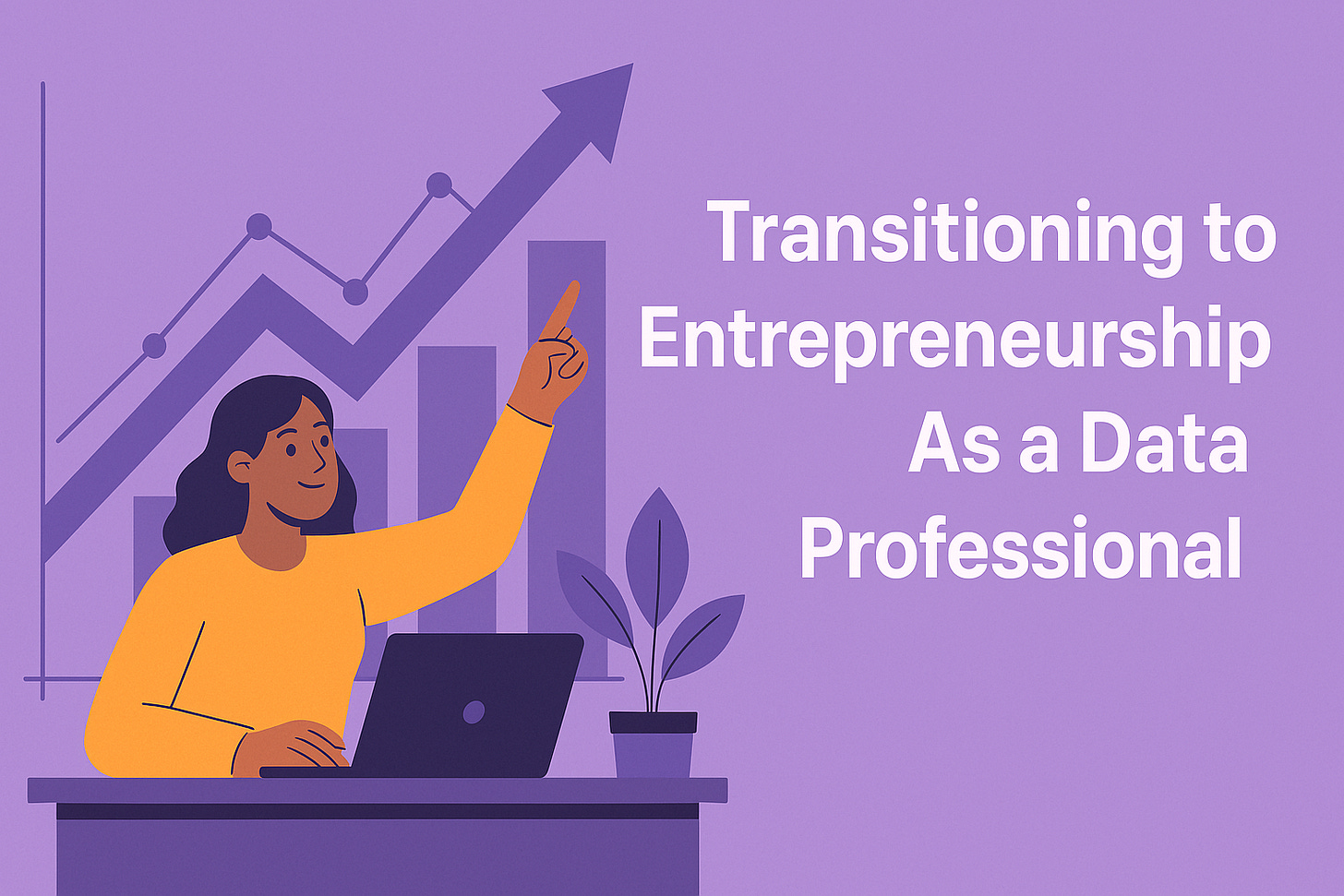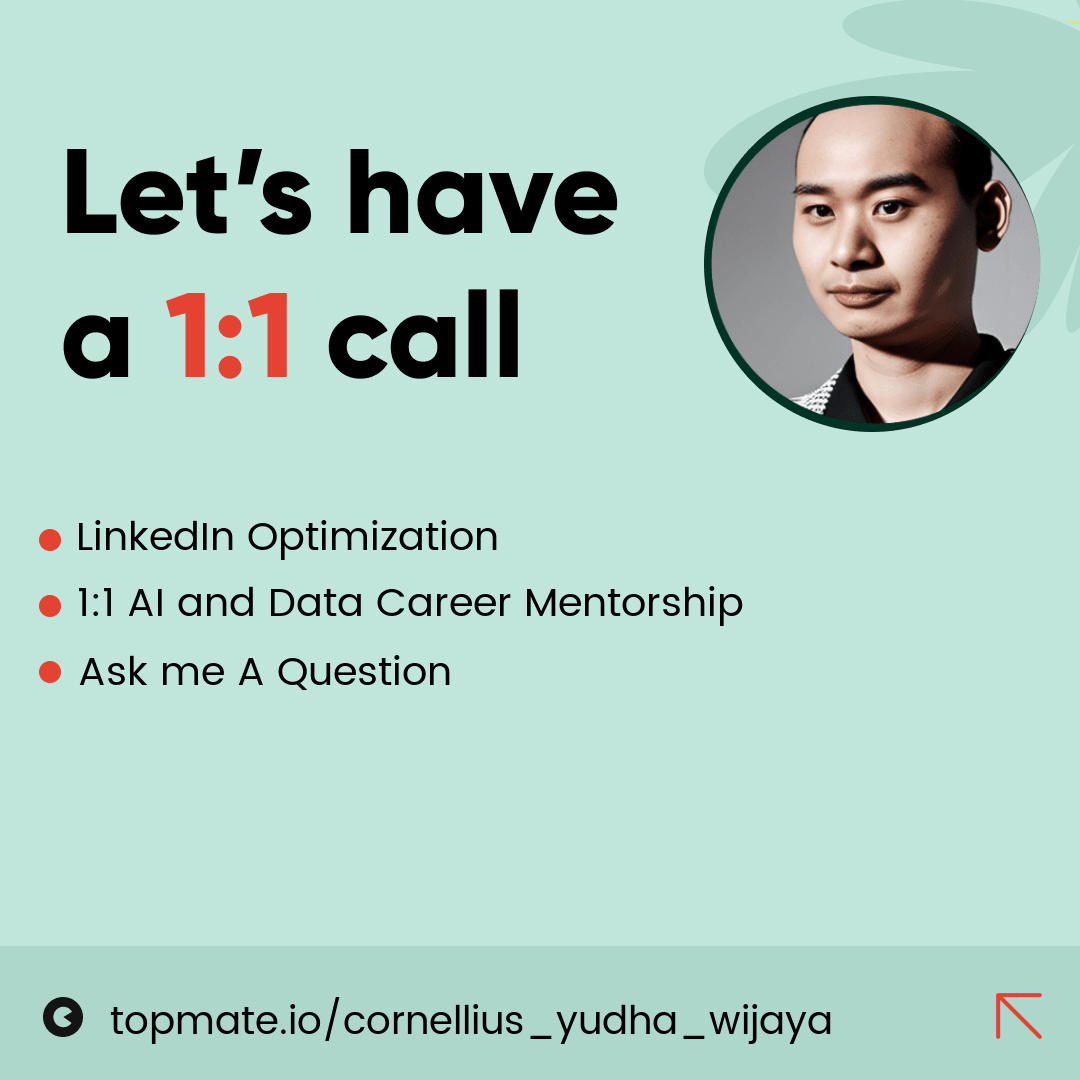What No One Tells You About Growing in a Data Career After Year 6
The reality for the one who pursuin this career
Alright, this edition mostly comes from my experience, as I am currently in my seventh year of a data professional career.✨
It’s a career I choose to switch to, and I will love doing it for many years to come.
However, growing in a data career is not easy, and there are many things I wish to tell my younger self before I reach this point.
That’s why I want to share my experience and view in this article with all the readers. The point of this article is for you to know what to expect when you are already deep in your data career.
So, let’s get into it!
Don’t forget to subscribe to get access to these amazing pro tips! 👇👇👇
What Happened in the First Five Years?
I clearly remember how I felt when I received that offer to work as a Data Scientist while switching careers, and, of course, I am very happy about it.
However, this is just the beginning of a journey, as the first five years appear to serve merely as a foundation for long-term exploration. Here are my experiences during that time.
Year 0–1: Starting Out in the Data Field
This inaugural year is about building the essential tools and knowledge for the climb of the upcoming year.
I can confidently say that this year, I am exploring my career extensively, particularly in technology. To summarize my progress, it looks may like this:
Programming Fundamentals: Enhancing proficiency in Python.
Statistical Foundations: Deepening understanding of core statistical concepts.
Data Management: Developing skills in SQL for efficient data handling using real data.
Personal Projects: Apply theoretical knowledge to real-world scenarios and start writing on the blog.
Responsibilities: Focusing on data collection, cleaning, exploratory analysis, simple machine learning, and basic visualization.
It’s the year when I am focused on building my technical foundation and starting to consider my long-term goals.
Years 1–3: Building Competence and Confidence
After a year, the next three years are more about deepening my knowledge in the field while building confidence in my career so that I can take on more responsibilities.
Summary of what I have done:
Advanced Programming: Enhancing proficiency in Python for efficient data manipulation and analysis.
Statistical Analysis and Machine Learning: Deepening understanding of statistical methods and machine learning algorithms to build predictive models. I am working on building my own algorithm.
Data Visualization and Communication: Mastering tools for data visualization and learn how to communicate insights effectively, especially to non-technical audiences.
Cross-functional collaboration: Collaborated with various departments and actively sought to lead projects to address business problems.
Continuous Learning: Staying updated with emerging technologies and methodologies.
Personal Branding: Keep building my presence in the Social Media world while providing learning material to others.
Side Project Expansion: I am trying to build my project portfolio and have a side-hustle business.
These are exciting years as I am still in my early career but already understand that I want to move forward inside and outside my company.
Years 4-5: Expanding Responsibilities
The years 4–5 of my data career are already evolving to encompass greater responsibilities, with more focus on strategic thinking and leadership opportunities.
It’s the phase that I consider crucial for setting the foundation for advanced positions and specialization within this field. I'm determining the specific goals I want to pursue in these years.
Here is the summary of what I am focusing on within these years:
Domain Expertise: Developing a deep understanding of my working industry sectors as I understand what happens in my domain.
Project Leadership: Managing data science projects from conception to deployment, ensuring alignment with organizational objectives.
Mentorship: Guiding junior team members to enhance their skills and contribute effectively to the team.
Stakeholder Communication: Translating complex data findings into actionable business strategies through effective collaboration with cross-functional teams.
Strategic Influence: Contributing to developing data-driven strategies that support long-term business goals.
Continuous Learning: Staying updated with emerging trends and technologies in data science to maintain a competitive edge and focusing on Generative AI as well.
Maturing Personal Business: With the foundations already there, I focus more on my business and personal branding.
After five years in my data career, I recognize my strengths and future goals. Yet, I feel my skills and career have stagnated.
What should be done then in the next phase of our careers? Here is what I am doing.
Year 6+: The Quiet Shift No One Talks About
By the time we hit our sixth year in the data professional works, we are no longer the new hire eager to prove ourselves, nor are we simply climbing the steep early-career learning curve.
We have likely built dozens of models, cleaned thousands of datasets, and delivered presentations that helped influence team decisions. On paper, we are Experienced. Competent. Valuable.
Yet beneath the surface, something unexpected can start to creep in: a quiet stall in momentum that nobody warned you about.
This phase is not marked by failure or underperformance. It’s just that the same habit we have will not necessarily advance our career.
The early validation gained from mastering new tools or watching models in production begins to feel like a regular occurrence. The thrill of addressing a new problem may fade as the challenges seem repetitive.
More importantly, promotions focus less on being a top performer and more on being visible, strategic, and influential. These are qualities that are rarely taught in most courses and are only learned once you have already started your career.
What You Can Do About It?
This plateau often arises from various factors, such as repetitive tasks, a lack of new challenges, and unclear paths for advancement.
However, for every problem, some solutions are presented to help prevent your career from stalling. Here are a few strategies to reinvigorate your career:
Pursue Varied Projects: Actively seek assignments that push your boundaries and expose you to new methodologies and industries. Commit to Ongoing Learning: Stay informed about breakthrough technologies and trends to ensure your skills remain relevant and marketable.
Network properly: Build Strong connections inside and outside your organization to uncover new opportunities and acquire valuable insights.
However, moving from a technical expert to a managerial position will require a different strategy if that’s your goal. Becoming a strategic influencer will involve broadening your role beyond individual contributions. Here's how to shift from “Building Models” to Building Influence:
Understand Business Objectives: Align your projects with the company's strategic goals to demonstrate the broader impact of your work.
Communicate Effectively: Translate complex data insights into actionable recommendations that stakeholders can easily comprehend.
Take Initiative: Identify areas where data can drive decision-making and propose solutions proactively.
Although the skills mentioned above aren’t necessarily enough if you are targeting a promotion in a leadership role, there are a few important skills you should consider if you are aiming for that promotion, including:
Leadership Abilities: Demonstrate the ability to lead teams, manage projects, and mentor colleagues.
Strategic Thinking: Highlight an understanding of market trends and how data can strategically position the company in a competitive landscape.
Emotional Intelligence: Skillfully navigates interpersonal relationships, fostering collaboration and resolving conflicts.
It’s not an easy feat, but it is necessary if we want to become leaders. However, there are also things that become more important if you want to get unstuck in your career: not becoming invisible.
To elevate your presence and value within the organization, here is something you need to do:
Document Achievements: Keep a record of your contributions and their effects for sharing during evaluations.
Seek Feedback: Regularly ask for input on your performance to pinpoint areas for improvement and demonstrate your commitment to growth.
Build a Personal Brand: Highlight your expertise through presentations, publications, or internal forums to position yourself as a thought leader.
Of course, there are many other paths you can take. For example, I am exploring the entrepreneurship path while actively building my startup and personal brand.
It’s a path that you might want to consider as well.
Transitioning to Entrepreneurship As a Data Professional
The analytical skills, problem-solving abilities, and technical expertise developed over years in the data field will create a solid foundation for entrepreneurial ventures.
This transition enables professionals to leverage their knowledge innovatively, develop new solutions, and attain greater career autonomy.
Real-World Examples
Shaw Talebi: After securing a six-figure salary as a data scientist, Talebi left his position to embark on an entrepreneurial path. His decision was driven by a desire for greater autonomy and the ambition to build something independently. Talebi's story shows the internal drive that motivates many professionals to transition into entrepreneurship.
Matt Dancho: With a background in data science, Dancho founded Business Science, a company specializing in data science consulting and education. His venture reflects a strategic move to apply his expertise in a business context, addressing the growing demand for data-driven insights in various industries.
Geetha Manjunath: After accumulating years of experience in data analytics research, Manjunath founded NIRAMAI, a health-tech startup that utilizes AI for noninvasive breast cancer screening. Her transition exemplifies how data professionals can leverage their skills to contribute significantly to societal challenges through entrepreneurship.
Losing a stable income is a scary thought, but sometimes becoming an entrepreneur can be very rewarding.
Navigating the Transition
This transition involves leveraging your existing technical expertise and developing new competencies essential for business ownership. It might require you to build a new skillset over the years.
Developing a Strategic Plan
A well-structured business plan is essential for guiding your entrepreneurial journey. This plan should outline your business objectives, target market, value proposition, revenue model, and operational strategies. It acts as a roadmap, helping you navigate the complexities of starting and growing a business.
Building Essential Business Skills
Transitioning to entrepreneurship requires acquiring skills beyond technical data science competencies. Familiarize yourself with finance, marketing, sales, and operations. Understanding these aspects is vital for effectively managing your business and making informed decisions.
Networking and Community Engagement
Engaging with both data science and entrepreneurial communities can provide valuable support and resources. Participating in networking events, joining professional associations, and seeking mentorship can offer insights, partnerships, and opportunities important in your entrepreneurial journey.
Embracing a Growth Mindset
Embracing a growth mindset is crucial for navigating the uncertainties of entrepreneurship. Be ready to face challenges, learn from setbacks, and continually pursue personal and professional development. This mindset will empower you to adjust to changing situations and launch your business forward.
Conclusion
Ultimately, the career choice is yours. After year 6, we may feel stagnant and that we are not progressing much; however, the reality is that we can still grow. It’s all about your career choices and what you want to do with them.
I hope this has helped!
Love this article? Don’t forget to share and comment!
If you're at a pivotal point in your career or sitting on skills you're unsure how to use, I offer 1:1 mentorship.
It's personal, flexible, and built around you.
Curious? Learn more:
For Short-Term mentorship, visit me here
For long-term mentorship, visit me here (you can even enjoy a 7-day free trial).




